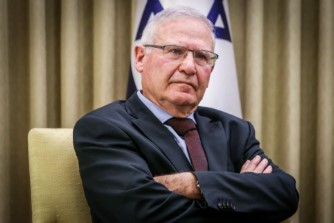In recent weeks, Israel has launched several airstrikes against Iran’s nuclear sites. These attacks were aimed at slowing down Iran’s ability to build a nuclear bomb.
Israel’s Recent Attacks and Concerns by Yadlin
Former Israeli military intelligence chief Amos Yadlin is one of the important figures discussing this. He thinks it’s time to act since Iran is coming closer to developing a nuclear weapon.
According to Yadlin, Iran has started removing restrictions that had earlier slowed down its nuclear program. He says that Iran is making technical preparations that will make it easier to build a nuclear bomb whenever its leadership decides to do so. This step is called the weaponization process, which means building the actual bomb after enriching the uranium.
Yadlin clarified that there are numerous components to Iran’s nuclear program. These include places where uranium is turned into gas, places where it is enriched, and facilities where it can be made into a nuclear warhead. A report from the International Atomic Energy Agency (IAEA) on May 31 confirmed that Iran has enriched uranium up to 60%—much higher than what is needed for peaceful purposes like making electricity.
Israel has already attacked several important sites in Iran. For example:
- Natanz: Where uranium is enriched to near-weapons grade.
- Isfahan: Where enriched uranium gas is turned into solid material for bomb cores.
- Arak: Where a heavy-water reactor is still under construction.
These strikes reportedly caused major damage. But Fordow, Iran’s most sophisticated and secure location, has not yet been impacted. Fordow is built deep under a mountain and houses Iran’s most important centrifuges. It’s also possible that weaponization research is happening there.
⚔️ Rising Lion Roars: Israel Launches First-Ever Coordinated Strike on Iran’s Nuclear Strongholds;
Why Yadlin Says Fordow Is Iran’s Most Critical Nuclear Site
Yadlin highlighted the special importance of Fordow. Unlike other nuclear sites, Fordow is built underground, between 60 and 110 meters deep. This makes it very hard to destroy. Even after the June 13 strikes on other locations, Fordow remains untouched. Yadlin said this means that a major part of Iran’s nuclear abilities is still safe.
Yadlin added that it’s very hard to measure how much damage the Israeli attacks have done. Instead of just looking at numbers, he says people should focus on what these attacks might help achieve politically. Israel’s main goal, according to Yadlin, is to help create a situation where the United States can push Iran into signing a better nuclear deal than the one in 2015.
The 2015 deal, known as the Joint Comprehensive Plan of Action (JCPOA), had allowed Iran to keep enriching uranium to low levels, but with many limits. However, Yadlin says that deal was not strong enough. It didn’t cover Iran’s ballistic missiles, military sites, or its support for groups that fight against Israel.
Now, after these strikes, Yadlin hopes the pressure might make Iran agree to stricter terms. He also pointed out that Iran’s Supreme Leader has not yet ordered the final step of building a nuclear bomb, but many signs show that Iran is preparing for it in secret.
Trump’s Role and the American Options
On June 13, President Donald Trump said that he would decide in two weeks whether the United States should join Israel’s military action. For Israel, this statement means two main possibilities. First, Iran might feel pressured to agree to a better deal. Second, if not, the U.S. might join Israel in attacking Iran’s nuclear program.
🚨 Iran Strikes Israeli Hospital: Soroka Medical Center Hit in Unprecedented Missile Attack
If the U.S. does decide to get involved, Yadlin believes there are two ways it might do so:
- Strike only Fordow: This would send a clear message. It would hurt Iran’s nuclear program without attacking civilians, government buildings, or infrastructure. The message would be: “We are targeting the bomb, not the people.”
- Wider military action: The U.S. could hit Fordow and also destroy Iranian warships and missile depots that might threaten American forces or allies in the region.
Yadlin says that these military actions could change the balance in the Middle East. He also believes that weakening Iran could help with other ongoing issues like the Israel-Gaza conflict, the Russia-Ukraine war, and peace talks between Israel and Saudi Arabia.
Talks Continue, But Major Disagreements Remain
Meanwhile, American and Iranian officials are already talking. There have reportedly been multiple phone conversations between Iranian Foreign Minister Abbas Araghchi and U.S. Special Envoy Steve Witkoff. Araghchi will also travel to Geneva to meet with European officials.
There is also a new idea being discussed. Instead of Iran enriching uranium on its own land, a regional consortium would do the enrichment outside Iran. This way, Iran could still use nuclear energy, but wouldn’t have control over the dangerous parts of the process. Nonetheless, the Supreme Leader of Iran has already stated that enrichment within Iran is non-negotiable.
Yadlin concluded that a good deal must fix the problems of the 2015 agreement. He said any new deal should allow full inspections of all sites, stop Iran’s production of ballistic missiles, and address Iran’s ties with groups that threaten Israel.

